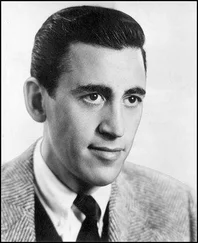Jerome Salinger - Nine Stories
Здесь есть возможность читать онлайн «Jerome Salinger - Nine Stories» весь текст электронной книги совершенно бесплатно (целиком полную версию без сокращений). В некоторых случаях можно слушать аудио, скачать через торрент в формате fb2 и присутствует краткое содержание. Год выпуска: 1953, Издательство: Little Brown, Жанр: Классическая проза, на английском языке. Описание произведения, (предисловие) а так же отзывы посетителей доступны на портале библиотеки ЛибКат.
- Название:Nine Stories
- Автор:
- Издательство:Little Brown
- Жанр:
- Год:1953
- ISBN:нет данных
- Рейтинг книги:4 / 5. Голосов: 2
-
Избранное:Добавить в избранное
- Отзывы:
-
Ваша оценка:
- 80
- 1
- 2
- 3
- 4
- 5
Nine Stories: краткое содержание, описание и аннотация
Предлагаем к чтению аннотацию, описание, краткое содержание или предисловие (зависит от того, что написал сам автор книги «Nine Stories»). Если вы не нашли необходимую информацию о книге — напишите в комментариях, мы постараемся отыскать её.
Nine Stories — читать онлайн бесплатно полную книгу (весь текст) целиком
Ниже представлен текст книги, разбитый по страницам. Система сохранения места последней прочитанной страницы, позволяет с удобством читать онлайн бесплатно книгу «Nine Stories», без необходимости каждый раз заново искать на чём Вы остановились. Поставьте закладку, и сможете в любой момент перейти на страницу, на которой закончили чтение.
Интервал:
Закладка:
He took a cigarette from a pack on the table and lit it with fingers that bumped gently and incessantly against one another. He sat back a trifle in his chair and smoked without any sense of taste. He had been chain-smoking for weeks. His gums bled at the slightest pressure of the tip of his tongue, and he seldom stopped experimenting; it was a little game he played, sometimes by the hour. He sat for a moment smoking and experimenting. Then, abruptly, familiarly, and, as usual, with no warning, he thought he felt his mind dislodge itself and teeter, like insecure luggage on an overhead rack. He quickly did what he had been doing for weeks to set things right: he pressed his hands hard against his temples. He held on tight for a moment. His hair needed cutting, and it was dirty. He had washed it three or four times during his two weeks’ stay at the hospital in Frankfurt on the Main, but it had got dirty again on the long, dusty jeep ride back to Gaufurt. Corporal Z, who had called for him at the hospital, still drove a jeep combat-style, with the windshield down on the hood, armistice or no armistice. There were thousands of new troops in Germany. By driving with his windshield down, combat-style, Corporal Z hoped to show that he was not one of them, that not by a long shot was he some new son of a bitch in the E.T.O.
When he let go of his head, X began to stare at the surface of the writing table, which was a catchall for at least two dozen unopened letters and at least five or six unopened packages, all addressed to him. He reached behind the debris and picked out a book that stood against the wall. It was a book by Goebbels, entitled “Die Zeit Ohne Beispiel.” It belonged to the thirty-eight-year-old, unmarried daughter of the family that, up to a few weeks earlier, had been living in the house. She had been a low official in the Nazi Party, but high enough, by Army Regulations standards, to fall into an automatic-arrest category. X himself had arrested her. Now, for the third time since he had returned from the hospital that day, he opened the woman’s book and read the brief inscription on the flyleaf. Written in ink, in German, in a small, hopelessly sincere handwriting, were the words “Dear God, life is hell.” Nothing led up to or away from it. Alone on the page, and in the sickly stillness of the room, the words appeared to have the stature of an uncontestable, even classic indictment. X stared at the page for several minutes, trying, against heavy odds, not to be taken in. Then, with far more zeal than he had done anything in weeks, he picked up a pencil stub and wrote down under the inscription, in English, “Fathers and teachers, I ponder `What is hell?’ I maintain that it is the suffering of being unable to love.” He started to write Dostoevski’s name under the inscription, but saw—with fright that ran through his whole body—that what he had written was almost entirely illegible. He shut the book.
He quickly picked up something else from the table, a letter from his older brother in Albany. It had been on his table even before he had checked into the hospital. He opened the envelope, loosely resolved to read the letter straight through, but read only the top half of the first page. He stopped after the words “Now that the g.d. war is over and you probably have a lot of time over there, how about sending the kids a couple of bayonets or swastikas …” After he’d torn it up, he looked down at the pieces as they lay in the wastebasket. He saw that he had overlooked an enclosed snapshot. He could make out somebody’s feet standing on a lawn somewhere.
He put his arms on the table and rested his head on them. He ached from head to foot, all zones of pain seemingly interdependent. He was rather like a Christmas tree whose lights, wired in series, must all go out if even one bulb is defective.
The door banged open, without having been rapped on. X raised his head, turned it, and saw Corporal Z standing in the door. Corporal Z had been X’s jeep partner and constant companion from D Day straight through five campaigns of the war. He lived on the first floor and he usually came up to see X when he had a few rumors or gripes to unload. He was a huge, photogenic young man of twenty-four. During the war, a national magazine had photographed him in Hurtgen Forest; he had posed, more than just obligingly, with a Thanksgiving turkey in each hand. “Ya writin’ letters?” he asked X. “It’s spooky in here, for Chrissake.” He preferred always to enter a room that had the overhead light on.
X turned around in his chair and asked him to come in, and to be careful not to step on the dog.
“The what?”
“Alvin. He’s right under your feet, Clay. How ‘bout turning on the goddam light?”
Clay found the overhead-light switch, flicked it on, then stepped across the puny, servant’s-size room and sat down on the edge of the bed, facing his host. His brick-red hair, just combed, was dripping with the amount of water he required for satisfactory grooming. A comb with a fountain-pen clip protruded, familiarly, from the right-hand pocket of his olive-drab shirt. Over the left-hand pocket he was wearing the Combat Infantrymen’s Badge (which, technically, he wasn’t authorized to wear), the European Theatre ribbon, with five bronze battle stars in it (instead of a lone silver one, which was the equivalent of five bronze ones), and the pre-Pearl Harbor service ribbon. He sighed heavily and said, “Christ almighty.” It meant nothing; it was Army. He took a pack of cigarettes from his shirt pocket, tapped one out, then put away the pack and rebuttoned the pocket flap. Smoking, he looked vacuously around the room. His look finally settled on the radio. “Hey,” he said. “They got this terrific show comin’ on the radio in a coupla minutes. Bob Hope, and everybody.”
X, opening a fresh pack of cigarettes, said he had just turned the radio off.
Undarkened, Clay watched X trying to get a cigarette lit. “Jesus,” he said, with spectator’s enthusiasm, “you oughta see your goddam hands. Boy, have you got the shakes. Ya know that?”
X got his cigarette lit, nodded, and said Clay had a real eye for detail.
“No kidding, hey. I goddam near fainted when I saw you at the hospital. You looked like a goddam corpse. How much weight ya lose? How many pounds? Ya know?”
“I don’t know. How was your mail when I was gone? You heard from Loretta?”
Loretta was Clay’s girl. They intended to get married at their earliest convenience. She wrote to him fairly regularly, from a paradise of triple exclamation points and inaccurate observations. All through the war, Clay had read all Loretta’s letters aloud to X, however intimate they were—in fact, the more intimate, the better. It was his custom, after each reading, to ask X to plot out or pad out the letter of reply, or to insert a few impressive words in French or German.
“Yeah, I had a letter from her yesterday. Down in my room. Show it to ya later,” Clay said, listlessly. He sat up straight on the edge of the bed, held his breath, and issued a long, resonant belch. Looking just semi-pleased with the achievement, he relaxed again. “Her goddam brother’s gettin’ outa the Navy on account of his hip,” he said. “He’s got this hip, the bastard.” He sat up again and tried for another belch, but with below-par results. A jot of alertness came into his face. “Hey. Before I forget. We gotta get up at five tomorrow and drive to Hamburg or someplace. Pick up Eisenhower jackets for the whole detachment.”
X, regarding him hostilely, stated that he didn’t want an Eisenhower jacket.
Clay looked surprised, almost a trifle hurt. “Oh, they’re good! They look good. How come?”
“No reason. Why do we have to get up at five? The war’s over, for God’s sake.”
Читать дальшеИнтервал:
Закладка:
Похожие книги на «Nine Stories»
Представляем Вашему вниманию похожие книги на «Nine Stories» списком для выбора. Мы отобрали схожую по названию и смыслу литературу в надежде предоставить читателям больше вариантов отыскать новые, интересные, ещё непрочитанные произведения.
Обсуждение, отзывы о книге «Nine Stories» и просто собственные мнения читателей. Оставьте ваши комментарии, напишите, что Вы думаете о произведении, его смысле или главных героях. Укажите что конкретно понравилось, а что нет, и почему Вы так считаете.











